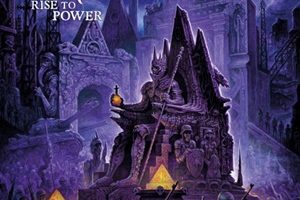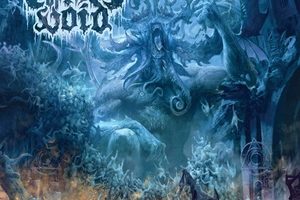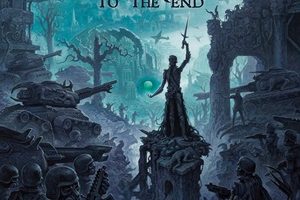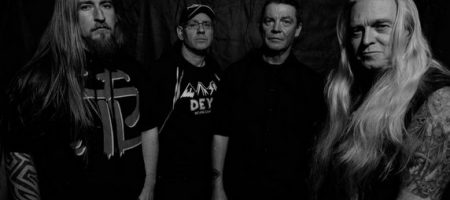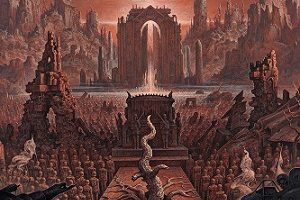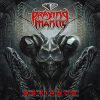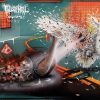Memoriam – An Eternal Struggle
Thursday, 9th February 2023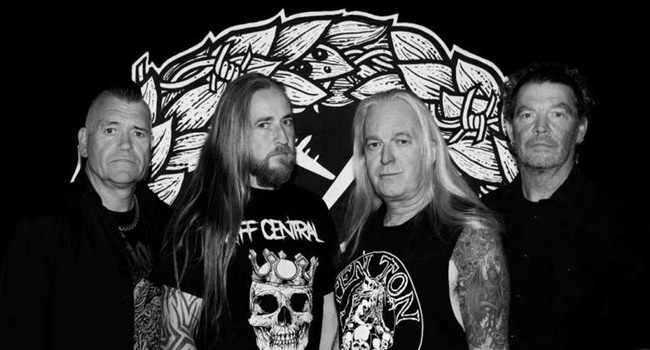
Heads down commitment to a cause usually pays dividends in the end – especially if all working parties deliver on all fronts. Such is the case with veteran old school death metal act Memoriam. Rise to Power is the quartet’s fifth studio album, another installment of fierce songwriting that speaks to listeners just as vivid, vibrant, and aggressive as the original inception for the movement back in the late 80’s through the 1990’s. We spoke to vocalist Karl Willetts regarding the quick turnaround to this latest effort, how Spike’s drumming adds more dynamics to the band’s approach, discussion on making their first music video, his thoughts on war being a major topic for Memoriam, more Dan Seagrave talk, plus insight into the sixth record.
Dead Rhetoric: Memoriam is back again with the fifth studio album Rise to Power. How did this set of material develop – was it easier or difficult to record again during the pandemic, and what are some of the highlights in your eyes?
Karl Willetts: That’s a lot of questions in one! (laughs). I would say we have picked a bit of a formula with Memoriam. We started off at a pretty rapid rate when we first got together in 2015. We released three albums in three years, it was the conception we set out to achieve when we first started out in bands back in the 80’s where bands did release an album every year. We were going to continue on that trajectory, and obviously COVID came along. It restricted our ability to meet up in the studio, rehearse, do gigs, the whole world stopped. It gave us an opportunity to step back a bit from that fast-paced activity. In retrospect it’s worked out pretty well for us. We maintain a steady flow; the next album came out in eighteen months for the fourth album. It affected the label, the label’s ability to get physical product to the market was the key to this, a backlog to get through. All the musicians couldn’t do gigs, they sat at home, they wrote and worked on albums. With technology, you can do that. Everyone was prepared once the COVID restrictions started to relax a little bit, here in the UK at first, we could get into a studio to record.
We are intentionally leaving at an eighteen-month gap between albums. It gave more time for the guitarist and musicians to formulate the riff structure. It gave me the opportunity for the first time to demo the lyrics before I went into the studio – which is a positive bonus for what I do. Having the ability to write the lyrics, rewrite the lyrics, deliver the lyrics in our home studio – whereas before I knew what the words were going to be, I knew what the timing structures would be, so we could work around this. All I had to concentrate on was actually delivering the songs. I was a lot more confident going in there. You spend a lot of time chopping things around in the studio. Down time can be expensive in the studio. We were more prepared for To The End, and we used that blueprint for this album as well. We are still learning things in our career, at our trade, and what works best for us as individuals as well as the band.
Dead Rhetoric: And also Spikey seems to really have upped his game on drums this time. Do you believe his time now being a little longer with the group gave him confidence to broaden his skills?
Willetts: Absolutely. We recruited Spike at the tail end of COVID. He joined the band about six to eight weeks before we were due to go into the studio for To The End. The pressure was on for him to deliver, and all he had to go by was the demos we created. He listened to this in isolation in Peterbrough, learned the songs that way. He was first in the studio, he recorded them, and he refined the demos with his little flourishes. He didn’t have the time to absorb the music completely and put his real stamp and authority on what he’s really about drumming-wise. There were tastes of what he could achieve, specifically on “As My Heart Grows Cold”, it gave us a hint of what direction we could go on. He’s had two more years with the band, with this album, he’s been involved in the creative process a lot more, he’s had a chance to absorb it all. Obviously on this album he really shines through, it makes this album what it is. The patterns he’s put in there are incredible, brought the whole band to a different level. No disrespect to our old drummer Andrew, one of my greatest mates. Spike adds a new dimension and gives a lot more room to explore different types of textures. One of the things we haven’t explored with Spike is his masterful ability to create the d-beat. We will see more of that featured on album number six, which we are currently in the process of writing.
Dead Rhetoric: Being the second part of the latest trilogy of albums, do you have a rough outline of how you want the lyrics to go and then fill things out based on the atmosphere, tempos, and riffs presented to you musically – or are you always developing ideas, refining them, and filing away for later use?
Willetts: Yeah. Lyrically, I work within certain parameters, as it is old school death metal. There are three main things I stick to – the old standard default is the theme of war, believe it or not. It features quite heavily over the years, since I started writing in metal. But also with Memoriam, I am happy to expand on subject matter – songs that have a bit of social, political, cultural context to them. Make a comment on the issues in the world around us that I feel are important. Things that I think are wrong as a vocalist and lyricist, it’s my position to do that and key to push my agenda with Memoriam. As I have gotten older, I enjoy writing songs about general experience and life in general. The people around us – the lyrics are a document of a specific point in time. Maybe with the previous album was a picture of that point in time – the rapid rise of right-wing nationalism, Black Lives Matter, anti-racist lyrics. This album now, it speaks to reference of events now, the war in the Ukraine. We go back to the theme of war. It seems now, the lyrics of war seem more relevant than they ever have in the past. I didn’t anticipate that would be the case.
The themes I’m writing about, may have been separate in the past. Those subject matters now have merged into one. War is a social-political issue at this point in time, the experience I have from a distance, being horrified by the situation. It makes this a strong album, we can all relate to these feelings, shared experiences and feelings. It sets this album apart – the push and development of Scott’s writing ability as well is key. It’s all about the riff. Scott is a prolific songwriter; he lives for writing music. He will come home from work, go upstairs in the studio and writes songs, every day, every night, writing music constantly. We have this million-dollar riff vault as a result, it’s always full. He can write stuff for his other project, As the World Dies, writes stuff for a project we are doing together, he has all these riffs for Memoriam that he can plunder at will. Musically album number six is halfway done already, Scott has created a lot of riffs. He could release ten albums with the amount of riffs he has available in his hard drive and computer at home. It’s the driving force of what we do.
Dead Rhetoric: Tell us about the video shoot for “All Is Lost”, directed by Hal Sinden for Eulogy Media Ltd. Do you enjoy this medium for garnering more promotion through social media platforms, and how did the concept come about between yourselves and the director?
Willetts: It’s a bit of blur really. I’ve never, ever done a full video production, where we go off to a studio to an outside location, sort of a structured script to follow, a budget, actors. To be able to do that at this point in my career, it’s absolutely incredible. The final product is a knockout, it’s won awards already. We always normally do the lyric videos, which are great, easy, cheap. Let’s push the button and do an epic video – it was fun to do. Hal Sinden, the actor Donald Sinden is famous for The Cruel Sea, and Never the Twain, a comedy series – a classic British actor, Hal is his nephew. We thought this would be an interesting connection. My concept of the song, it’s a song about hope, when all is lost, you hold onto the things that are important in life. We’ve all been there, the final end, everything is gone. From my perspective, but Hal interpreted it in a different way, that life is in the moment, it’s brief, it’s quick. As a result, you have to enjoy it for what it is. Hence the reference to the King, which features as the main vehicle for the storyline of the video. You see the king being crowned, dragged out from the dungeon, and then being killed. All within three or four minutes, to exaggerate that life is short kind of feel.
A totally different interpretation, but ties in quite nicely with the album cover, and ties in with the death of the Queen and the reinstatement of Prince Charles as the king rising. It was a great experience. It cost a little money, but we had fun doing it, and we think we are going to do it again moving forward. We’ve learned how it adds to our blueprint of what works for us, what we like doing. Hopefully work with Hal again – he had a clear concept and idea of what he wanted to achieve in the two days we were recording this. It was great to see him at work and doing what he does best. It’s been nominated for some awards, so it’s a vehicle to help promote the band and get us out to a slightly wider audience.
Dead Rhetoric: War-oriented themes appear to be a consistent hallmark for Memoriam – and for this record you touch on the World War II holocaust while also taking into consideration the current war Russia is conducting against the Ukraine. What are your views on war as you’ve studied it over the years – do you believe mankind still struggles with the long-term implications of these conflicts?
Willetts: Oh yes. It’s the eternal struggle. The continued blight of mankind, it’s been going forever. There are wars that exist across the planet, not just in the Ukraine. It’s on our European doorstep. All the nations of the war need to do what we can to stop the neoimperial, needs and wants of a raving mad man like Putin. I see on social media some Americans whining about how much it costs – our country being in a bad way, millions of pounds to the Ukraine. It’s the cheapest form of self-defense you have got – we are not losing your personnel. It’s defense against aggression. We have to stop it in the Ukraine – because who’s next?
We all need to maintain our support, and are aware of the situation. I’m in contact with some people in the Ukraine, we met at a German metal festival. I wish them well, I feel for their suffering. It’s touching moments, we need to support the people. It’s heart wrenching, all I can do as a lyricist is to write words, if it helps or touches people and gives strength to people, that small piece is what I do.
Dead Rhetoric: Once again Dan Seagrave created a mesmerizing cover – the purple hues allowing the imagery to stand out even more. Last time we talked you thought his work for To the End was his best to date for the band – where does this piece stand in the catalog of Memoriam covers? What would surprise us to learn about Dan the person as you’ve gotten to work with him over the years?
Willetts: He hits it out of the park every time. We gave him a rough idea of what we saw – it’s like a rise to power and the crowning ceremony of the king, working in that reverse trilogy like George Lucas with the storyline we are telling. To the End was the end point of his life, but he’s still alive, this album shows him in a former state as the king rising to that power. We asked him to do it in a purple hue as it’s a majestic kind of color. He goes away and scribbles different directions and angles – maybe six or seven proposals, and we select which one we prefer the most – and then he develops that idea further. Each stage of the artwork and visual, we are linked into that process, and he shows us step by step, from the inking process to the coloring process. That aspect is quite flexible, he will add different figures in there. It’s incredible to work with him. He is our artist, of five albums. It wouldn’t be a Memoriam album without a Dan Seagrave cover. He will be there obviously for the next one.
He is in so much demand as well. He has that old school death metal feel. Scott suggested him when we first got together. It’s a perfect alignment, an essential part of the blueprint and the formulas of what makes Memoriam, Memoriam. Russ Russell also must be mentioned, the producer and mix master general. He is essential to what we do. It’s taken us a few years to get what we wanted, and we’ve got it now to build on those.
Dead Rhetoric: How does it feel to get nominations and win at international film festivals for your work? Does the recognition bring about a certain level of deeper satisfaction that you work impacts people to that upper level?
Willetts: Yes, Brad Pitt move over! (laughs). It’s incredible. It was never on my radar or agenda. We didn’t really do anything, we made a video and it’s a surreal experience all around. It’s down to the skills of the director and what he brings to the production. We are very glad to be a part of that and a vehicle for (Hal) to get those awards.
Dead Rhetoric: Do younger musicians ever seek out advice from you regarding the music business – and if so, what words of wisdom or ideas do you try to impart upon them?
Willetts: There are lots of bands that end up drawing reference from the music I’ve been a part of, and I’ve created in the past, and that’s great to see the reemergence and reverence for old school death metal music. It helps us achieve what we want to achieve as well with Memoriam. I get quite a few people who approach me about technique, longevity, how do I do it. It’s quite simple, the best piece of advice I can give is just enjoy things for what they are. Life is too short to do anything else. Whatever level you are doing things at, be it a demo level within a rehearsal room, cranking out tunes and drinking beers, as long as you enjoy what you are doing, that’s all that matters. If other people like it and it grows, that’s a bonus. The key to success is to enjoy what you are doing. Once you start worrying about everything else and stop enjoying what you are doing, that’s the time you should stop. Don’t try to emulate other things. It’s got to be true from yourself.
Dead Rhetoric: What’s on the agenda for activities related to Memoriam over the next twelve months when it comes to shows, festivals, etc.? As I understand behind the scenes, Scott for instance is already hard at work demoing material for the sixth album, correct?
Willetts: We were quite busy last year. We are not going to be one of those bands that jumps on a tour bus and do an extended tour of 30-40 dates. I did that in the past when I was younger, and it was fine. As you get older, life changes, we have different responsibilities. Jobs, families, homes. To be brutally honest, if we did 30 dates of a European tour, I’d be dead by gig number six. I haven’t got the energy anymore to do that. Our fanbase are potentially older these days, with the same responsibilities. I rarely go out to gigs these days, unless it’s on the weekend. I don’t want to do a gig on a Tuesday night in the middle of nowhere to 30 people anymore, that doesn’t fill me with joy. We select what we want to do, on a gig-by-gig basis. We do spend every other weekend doing shows, 30 shows a year. We do things on our own terms.
You have to travel 12-15 hours to a gig and play it. Twenty or thirty years ago it wasn’t a problem, but now at 56 years old, it can be a bit more of an issue. We will do as many shows as we can. It is quite crowded scene wise, a lot of bands touring. We will write album six, get the trilogy completed. We are enjoying things for what it is, having fun with our mates.











